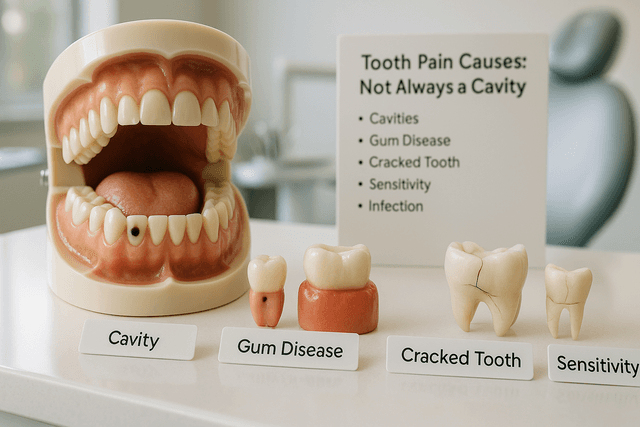General Dentistry
Healing After 1 Week: Full Mouth Extraction
Undergoing a full mouth extraction is no small event, it’s a major step in your dental health journey. Whether you’re preparing for implants, dentures, or addressing serious oral health issues, understanding what recovery looks like one week after the procedure can give you peace of mind and help you heal properly.
5 min read
Aug 06, 2025

Tooth Extraction Isn’t a One-Tooth Situation Anymore
So, you had multiple teeth pulled. Maybe even all of them. Whether it was due to tooth decay, gum disease, or preparing for dentures or dental implants, a full mouth extraction is a big deal, and your mouth knows it. Now, one week later, you're likely wondering, “Is this what healthy healing is supposed to feel like?”
Let’s walk through exactly what normal recovery looks like, what to watch for, and how to make sure your healing journey stays on track. Trust us, your future smile is worth the care.
Extraction Healing Timeline
When it comes to tooth extraction healing, that first week is pretty telling. The healing time can vary depending on factors like age, general oral health, and whether you had simple extractions or more involved oral surgery (think impacted wisdom teeth or dental trauma).
During the first 48 hours, blood clots form in the socket. These blood clots are the MVPs of healing, protecting the exposed bone and nerve endings while helping new gum tissue grow. If a clot dislodges, that’s where things can get painful and slow. Dry socket, anyone?
By day 7, the pain and discomfort from the extraction site should be tapering off. The swelling? Mostly gone. You might even feel up to eating something that isn't baby food. But no solid foods just yet, soft foods still win the day.
Tooth Extraction Healing Stages After One Week
Let’s break down the stages of tooth extraction healing so you know what’s behind (and ahead) in your recovery:
Initial healing (first 24–48 hours): This is all about clot formation and controlling bleeding with gauze, rest, and ice packs.
Gum tissue starts to heal: From day 3 to about week 2, your gums are busy regenerating. Redness fades, the pain lightens, and the socket starts closing.
Bone healing kicks in: Around weeks 3–4, your jawbone begins the deeper, slower healing process. The entire healing process can take weeks or even months.
Yes, it takes time, but your body knows what it's doing, if you give it the right help.
Healing Time Depends on the Type of Extraction
How long does it take to heal from full mouth extraction? Good question. The tooth extraction healing time depends on the type of extraction performed.
Simple extractions: (Like pulling a loose or already damaged tooth) heal faster, usually 7 to 10 days for initial recovery.
Surgical extractions: Including those performed by oral and maxillofacial surgeons, take longer due to the complexity and sometimes stitches involved.
Having multiple teeth extracted adds another layer to the healing timeline. You're dealing with several open sites, each needing care and attention. So while one tooth pulled might feel better in a week, a full mouth might take 2–3 weeks for things to really settle.
Signs You’re Healing Well After Full Mouth Tooth Removal
It may not shine with glamour, but the signs of healing are undeniable. Here’s what proper healing looks like one week after a full mouth tooth removal:
Blood clots are still intact in each socket, a great sign.
Pain is minimal and manageable with over-the-counter pain relievers like ibuprofen.
There’s little to no bleeding.
The gum tissue is closing around the extraction sites.
Swelling is down, and any bruising is fading.
Bonus: If your breath is improving and you can speak and eat more comfortably, you’re on the right path.
First 48 Hours Matter More Than You Think
The first 48 hours after a tooth extraction are mission critical. This is when the extraction site is most vulnerable to issues like dry socket or infection. It’s also when oral surgery post-op care matters most.
So, follow these post-operative instructions:
Don’t dislodge that precious blood clot by rinsing or spitting too aggressively.
Use gauze as directed to control bleeding.
Apply an ice pack in 15-minute bursts to reduce swelling.
Take over-the-counter or prescribed pain medication as needed.
Miss any of these steps, and you could delay healing, and we don’t want that.
Dentist Tips for a Smooth Recovery
Want to heal faster and feel better while you're at it? Your dentist would likely offer a few smart, real-world pointers:
Keep the extraction site clean, but gently. Rinse with salt water starting within a day or two, but avoid brushing directly over the sites for at least a few more days.
Stick with soft foods. Applesauce, mashed potatoes, smoothies…they’re your best friends right now. Solid foods can wait.
Stay hydrated, but skip the straw, suction can dislodge your blood clot.
Avoid smoking, vaping, or alcohol. All of these can impair healing.
Maintain good oral hygiene, but again, gentle is the name of the game.
Stages of Healing Can Vary, So Listen to Your Mouth
If you're wondering how long it will take to feel "normal" again, the answer is: it depends. The recovery time for full mouth tooth extraction can vary. Some bounce back quickly, others need more TLC.
The typical healing experience looks like this:
By day 7: Less pain, smaller sockets, lower risk of dry socket.
By week 2: Major healing done, gum tissue well on its way.
By week 3–4: Bone healing continues, and you may be ready for dentures or dental implants.
Still feeling rough at this point? It might be time to contact your dentist. Prolonged pain or discomfort, bad taste, or swelling could point to signs of infection.
Healing and Recovery After Removing One Tooth vs. Full Mouth
Removing one tooth is a walk in the park compared to having all your natural teeth removed at once. If you had a single tooth extracted, your body has fewer demands and typically heals quicker.
With a full mouth dental procedure, you’re juggling more inflammation, more open wounds, and a higher risk for infection. But with good habits, your healing and recovery can still be smooth. If you experience discomfort with your new prosthetics, timely denture adjustments and repairs can help.
What Are the Signs of Healthy Healing One Week After Full Mouth Extraction?
At the one-week mark, signs of healthy healing include intact blood clots, reduced pain, minimal or no bleeding, gum tissue beginning to close over the sockets, and reduced swelling or bruising. You should also be able to eat soft foods more comfortably and notice fresher breath.
How Long Does It Take to Heal After Full Mouth Extraction?
Initial healing typically takes 7 to 10 days, but complete recovery, including bone healing, can take several weeks. Simple extractions heal faster than surgical ones, and full mouth procedures take longer due to multiple healing sites and increased inflammation.
What Should I Avoid During the First Week of Recovery?
To protect healing sockets, avoid smoking, alcohol, straws, and hard or crunchy foods. Don’t brush directly over the extraction sites, and avoid vigorous rinsing or spitting. Stick to soft foods, rinse gently with salt water, and follow all post-op instructions closely.
When Should I Contact My Dentist After a Full Mouth Extraction?
Contact your dentist if you experience worsening pain, a bad taste or smell in your mouth, prolonged bleeding, visible pus, or signs of infection. These symptoms may indicate dry socket or other complications that require prompt attention.
Read Next
Related Posts

General Dentistry
Is Tooth Pain Always a Cavity or Could It Be Something Else?
Tooth pain can strike at the most inconvenient times, leaving you wondering what’s behind that sudden ache or sharp twinge. While cavities are a common culprit, they’re not the only reason your teeth might be hurting. Understanding the different causes of tooth pain can help you take the right steps toward relief and better oral health.
4 min read
Aug 25, 2025

General Dentistry
Dental Terminology for Front Desk: Boost Accuracy and Professionalism
Working the front desk at a dental office means juggling patients, appointments, and insurance details, all while staying calm and professional. One of the most powerful tools in your toolkit? A solid understanding of dental terminology. Knowing the right terms not only boosts your confidence but also improves communication and accuracy across the entire practice.
8 min read
Aug 24, 2025

General Dentistry
How Much Is a Dental Check-Up and What’s Included?
Regular dental visits are about more than keeping your smile bright, they’re essential for preventing serious oral health issues and saving money on future treatments. Understanding what’s included in a dental check-up and how much it costs can help you plan better and make informed decisions about your care.
5 min read
Aug 13, 2025
Don’t have time to research every dentist around you?
See why 30k+ patients trusted us